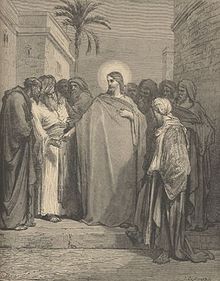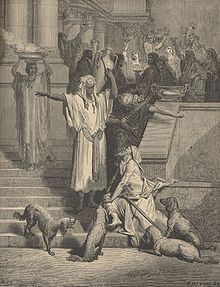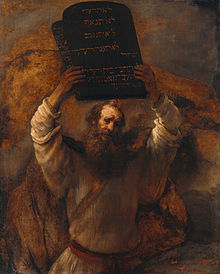Bible: What Does Luke 16 Teach Us Through Two Parables: "The Unjust Steward" and "The Rich Man and Lazarus"?
Jesus Addresses Pharisees

The Unjust Steward
Addressing His disciples (but also pharisaical money-lovers, v. 14), Jesus relates “The Parable of the Unjust Steward” (vv. 1-13).
This section continues one of the themes of “The Parable of the Lost Son”—that is, squandering goods—but approaches it differently.
In the earlier story, the son wastes his own possessions—wealth that had recently belonged to his father; here, an anonymous source accuses a steward of misusing the goods of his employer, a rich man (v. 1).
Assuming the truth of this report before hearing his steward’s excuse—the employer apparently had prior suspicions about the honesty of this man—, the wealthy owner terminates his manager, and demands an accounting from him (v. 2).
Forced to develop a quick resolution, the now unemployed steward, rationalizing about his inability to do manual labor and his being too proud to beg, does some creative thinking so that “they may receive me into their homes” (vv. 3-4).
[How was he mismanaging the business?
Was he using funds for his own private use?
Was he not collecting debts on time?
Whatever the offense was, the steward apparently did not hide it very well (v. 1)].
To avoid abject penury or prison, the steward had to invent a way to recoup some of the employer’s losses.
So, he calls “every one of his master’s debtors” (v. 5a)—two of whom Jesus mentions (oil [v. 6] and wheat [v. 7])—, and discounts their debt for paying early (?), so that he could recompense the owner who needed to satisfy his own creditors.
The steward’s shrewd dealings meet with the owner’s approval, but the text does not say whether the latter restores the former to his prior duties (v. 8a).
Jesus Teaches His Disciples

Unrighteous Mammon
view quiz statisticsThen Jesus makes an almost parenthetical statement, acknowledging the superior “shrewdness quotient” of the “sons of this world in their generation” over that of the “sons of light” (v. 8b).
[Is He saying that unbelievers are more astute and quick-witted in dealing with their own kind than believers are?
Does “shrewd” here have a negative connotation?]
“Making friends for yourselves by unrighteous mammon” (v. 9) seems to suggest that believers should maintain honest relationships with all types of people in the area of finances.
[The term “unrighteous mammon” does not refer to money earned dishonestly, but to the wealth acquired in this world.]
Later, Jesus contrasts this wealth with “the true riches” (spiritual responsibilities) [v. 11].
The clause, “When it fails, they may receive you into an everlasting home,” hearkens back to the case of the steward who, having misused the owner’s funds, still needed to “be received into their houses” (v. 9b; cf. v. 4).
If believers maintain honest relationships in the area of finances, they will stand innocent when the money “fails.”
It seems a foregone conclusion that it (or you, NU) will fail; Jesus says “when,” not “if.” When will money (or you) fail? At death?
And what connection does this “failure” have with their receiving you “into an eternal home” (v. 9b)?
Who receives you into an eternal home? Angels? The Trinity?
The verse, therefore, seems to emphasize that your honest financial dealings offer evidence of your righteous standing with God.
After adding a concluding aphorism—faithful in least, faithful in much, unjust in least, unjust in much—Jesus applies it to His disciples, saying, in essence, “Do not expect God to give you much of your own if you have not faithfully fulfilled your financial stewardship responsibilities for others” (vv. 11-12).
As a servant, you can be faithful to only one master; you cannot divide your emotional loyalties between two.
Christ’s final words on this point—“You cannot serve God and mammon”—presents His audience with a stark choice (v. 13).
As money-loving religionists, the Pharisees did not like the decision Jesus forced upon them (v. 14).
Though saying nothing aloud, their body language and grumblings must have told the Lord that they needed further instruction, for He augments His parable with another pointed accusation against His opponents.
In essence, Jesus responds, “With slick reasoning, you Jewish leaders can convince the public into believing that you somehow require extra funds to take care of ‘special needs’. However, you cannot fool God; He knows why you seek after wealth” (v. 15).
What relation verses 16-18 bear to the context is difficult to determine. Jesus has discussed each topic before, but has never strung them together as He does here.
If He is still addressing the Pharisees, He may be pointing out to them that it’s a new day.
The nation senses an urgency to enter the kingdom (v. 16); their action must mean that Jesus is fulfilling “to a tee” the law concerning the Messiah (v. 17).
More challenging is fitting into the context the Scriptural command against adultery that results from marrying after divorce.
Perhaps many Pharisees were disregarding this commandment, and Jesus is asserting that that sin made them unfit for the kingdom (v. 18).
Lazarus and the Rich Man

Paradise and Hades

The Lord delivers one more parable against the Pharisees—“The Rich Man and Lazarus” (vv. 19-31)—before addressing His disciples again.
[Although the text indicates no pause between the divorce-adultery issue and this story, Jesus must have assessed the situation and believed that it called for another illustration of His argument against poor stewardship of wealth.]
Christ paints a contrast between the daily lives of a rich man (a certain unnamed epicurean) [v. 19] and Lazarus, an ulcerous, impotent beggar whom the former can easily feed but does not.
Even dogs treat Lazarus better than does the rich man (vv. 20-21).
As time passes, both men eventually die (the only fate that both rich and poor share); Jesus then continues the contrast.
Whereas angels carry the beggar to “Abraham’s bosom” (a figure of Paradise), Dives (Latin for “rich man”)—“was buried,” the text says simply and significantly (v. 22).
The rest of the parable consists of a conversation between this former man of ease, now tormented in flame, and Father Abraham (vv. 23-31).
Seeing Lazarus in the patriarch’s “bosom” (v. 23b), Dives pleads that Abraham might send the former beggar with a “mercy drop” of water to cool his tongue (v. 24).
[Notice that Dives still regards Lazarus as his servant, and thinks that Abraham has taken over for him.]
Immediately, Abraham gives Dives a “reality check” about the “big picture”; he says, in essence, “You had your chance in life, son, but you blew it.
You cannot order Lazarus around anymore, and neither can I” (v. 25).
He also informs Dives about the impassable gulf between Paradise and Hades. So, even if Lazarus wished to help, he could not do a thing (v. 26).
Moses and the Law

Endless Torment
Do you believe in the endless torment of the unbelieving, as Jesus depicts here?
The tormented soul still has not learned the lesson that Lazarus is not his servant, for he again pleads for Abraham to send the man, now comforted, to his [Dives’] father’s house where he could warn his five lost brothers (vv. 27-28).
Abraham contends that Dives’ brothers should obey the message of Moses and the prophets (v. 29).
Knowing that his brothers do not believe the Scriptures, Dives is nonetheless convinced that they would repent if they received a ghostly visit (v. 30).
Abraham’s last word sadly concludes that, given their rejection of the Old Testament, Dives’ unbelieving brethren would not believe even if someone [veiled reference to Jesus] should “rise from the dead” (v. 31).
[Jesus presents a very sobering picture indeed of the destiny of the unbelieving.]
© 2013 glynch1








